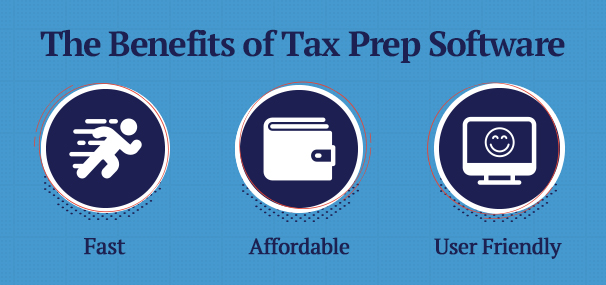The IRS begins accepting tax returns the second week of February, which means it’s time to get started on your taxes! Every year more tax prep software options promise to help you save money and time. Does tax prep software make completing your taxes easier? Are paid versions worth it?
The Benefits of Tax Prep Software
Gone are the days of filling out tax forms by hand. Although technically still an option, most of us no longer opt for picking up paper forms at our local library or post office. Instead, we use digital tax prep software.

Tax Prep Software Is Fast
Filling out forms by hand or manually editing a PDF is tedious and time-consuming. Tax prep software often offers interview-style data entry and automated data entry from past returns to save you time. Interview-style software will ask you questions about your life over the past year to determine what parts of the tax form you need to fill out.
Tax Prep Software Is Affordable
Most tax prep software offers a free version of their product. So what’s the catch? We compared the filing costs of three of the most common: Turbotax, H&RBlock, and TaxAct. They all have free versions for state and federal income taxes, but if you want the software to e-file the forms for you, there is an extra cost.
- Free for simplified taxes
- Deluxe and Premier tiers for itemized deductions, independent contractors, and small business owners
The Pros and Cons of Tax Prep Software
Tax prep software isn’t intended to take the place of a CPA. Instead, it’s meant to streamline the process for DIY filers. Software is an excellent choice for those who have tax returns that are simple or with one or two additional complications. In other words, as your taxes become more complicated, the value of tax prep software declines.
Best for People Who:
- Plan to DIY their taxes
- Are single and have a straightforward return
- Do not have taxable assets other than your income
- Plan to claim the Standard Deduction
- Are not self-employed
- Do not own a business
- Want an accountant to check their work without the hassle of hiring one
Tax prep software might be an OK option for people who plan to itemize, are self-employed, or run a small hustle, but these factors will complete the process and make it more expensive. Moreover, itemizing deductions, adding income from self-employment and other taxable assets require deluxe features. Accordingly, you may be better off hiring a CPA to make sure.
Might Not Be Right for You If:
- Are married and plan to claim exemptions and dependents
- Have taxable assets other than your income
- Plan to itemize deductions
- Are self-employed
- Own your own business
- Received an inheritance during the tax year
- Had a significant life change like getting married or divorced or being widowed
- Feel overwhelmed or confused when filing taxes
If you enjoy preparing your tax returns and are very knowledgeable about tax law, you may opt to stick with software, but most people reach a threshold where a DIY approach no longer makes sense. At that point, your time and money may be better spent going directly to a CPA.
What Experts Say About Tax Prep Software
According to Robert Farrington of The College Investor, “TurboTax consistently produces the highest quality, easiest to use tax filing software on the market, and H&R Block follows closely on its heels. TaxAct tends to lag the pack in terms of usability, but it also chalks in at the lowest price point.”
Forbes 6 Best Tax Preparation Software Companies of 2020
- H&R Block: Best Free Option
- TurboTax: Best Expert Help
- TaxAct: Best Free Option, Runner-Up
- TaxSlayer: Best Budget Option
- Liberty Tax: Best Value for the Self-Employed
- Jackson Hewitt: Best Virtual Tax Prep from Home
Please note: This blog is not a substitute for professional advice. We aren’t qualified to make decisions about your taxes. Only you can do that. We have, however, done extensive research about tax preparation. The results of this are a guidepost that can help consider your tax preparation options based on specific criteria.

